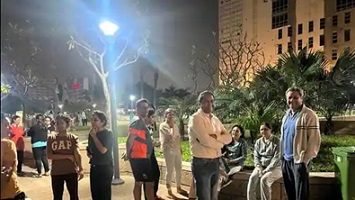The Gurugram district administration has directed developers to have a hi-tech earthquake security system in all high-rises that will raise the alarm upon tremors after which the control room will shut down lifts, gas supply, electricity, and activate necessary security systems. Officials said it will take at least a month to finalise the project and install such a system in the building.
Gurugram deputy commissioner Nishant Kumar Yadav said they have decided to install the security system in all high-rises that have 10 floors or more. “The project will be prepared with the help of developers and they will bear the cost of installation. We are yet to finalise the company that will be providing this equipment. The cost and other factors are yet to be decided,” he said. The control room will ensure that lifts are vacated within seconds and operations shut immediately, said officials
Yadav said they were planning to set this up since last year but after the recent earthquake, the need was felt to be more acute. Strong earthquake tremors were felt in northern India, including the Delhi-National Capital Region after a 6.6 quake struck northern Afghanistan recently.
“The system could help in quick rescue and better coordination during an earthquake as the secondary seismic waves are the ones that cause damage on the surface. The system will be installed by the developers on their condominiums and will have an indoor alarm system. The siren will alert everyone within a radius of one kilometre and caution people within 30 seconds of primary seismic waves,” he said.
Gurugram falls in seismic zone 4 making it highly vulnerable to earthquakes. It also has a nearly 20 lakh population but buildings are still awaiting the long-promised quake audits. There are over 900 high-rise buildings, 108 schools and more than 500 large, 5,000 medium and 3,500 small scale industries, all of these have to prepare contingency and response plans and get their premises evaluated as per the National Building Code, said officials, adding that there has been no dedicated audit to check for compliance of NBC.
The developers said they are ready to make changes for the safety of residents.
Kunal Rishi, CEO, Paras Buildtech, said the recent direction by the administration reinforces the importance of having a hi-tech earthquake security system in all high-rises. Our commitment to the safety of our residents has always been a top priority, and our well-developed high-rise with all necessary safety measures reflects that. We must continue to design buildings in this zone that are resilient to higher seismic forces and prioritise the safety of those who call these buildings home,” he said.
Vivek Singhal, CEO, Smartworld Developers, said their commitment to creating sustainable communities that prioritise safety and well-being remains unwavering. “We recognise the importance of adhering to safety guidelines and regulations, especially in a city such as Gurugram, which falls under seismic zone 4. The recent direction from the Gurugram administration on implementing a hi-tech earthquake security system in all high-rises is a step in the right direction, and we fully support this initiative. We have already taken steps to ensure our buildings are designed to withstand higher seismic forces and will continue to prioritise safety of residents in all our future projects,” he said.
In March 2016, Chandigarh was the first to install a hi-tech system that can help predict seismic activity within half a minute after the primary quake hits. This is a significant advance alert system that can help put in effect safety measures and facilitate search and rescue operations, said officials.
In 2016, after the Nepal earthquake, Gurugram had one such system installed at the Haryana Institute of Public Administration (HIPA) building, but since 2019, the system has remained defunct.
Ritu Bhariok, a resident of Westend Heights condominium in DLF 5, said this system is required in all condominiums urgently. “Regular surprise visits by the administration should also be in the plan. Once the system is installed across the city, evacuation drills should be conducted so that all residents know when and how to react to the security system,” she said.








